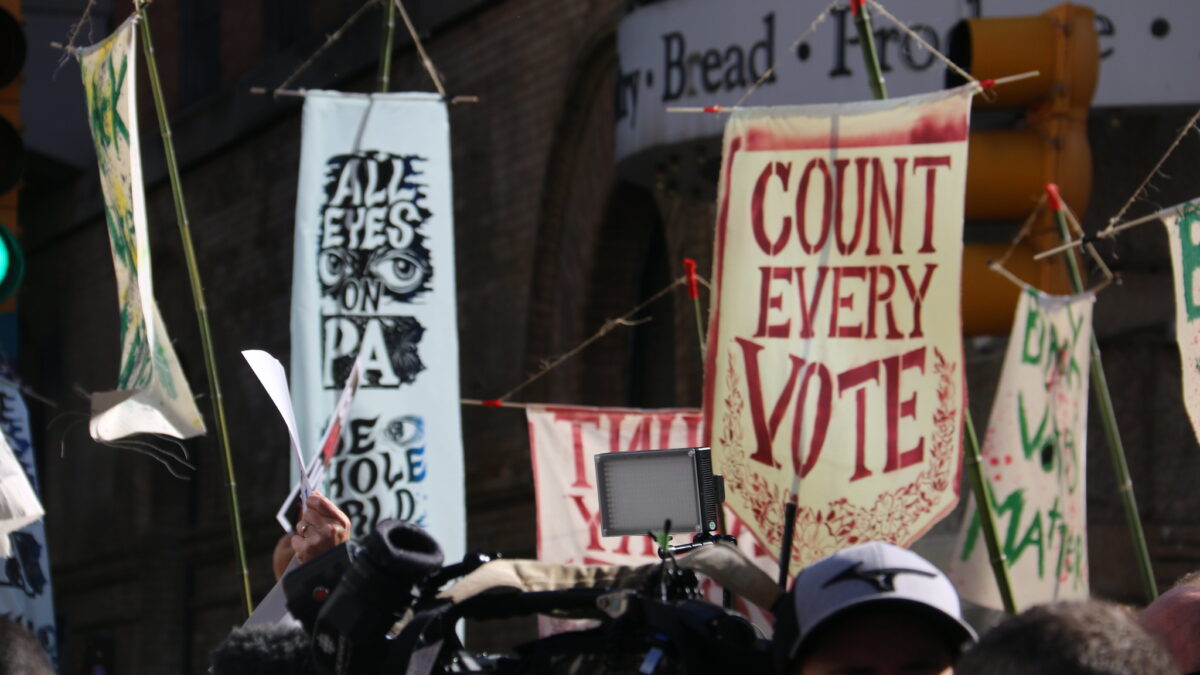As the 2022 midterm elections approach, all eyes are on Pennsylvania.
Ever since former President Donald Trump carried the key battleground state in 2016 (the first Republican presidential nominee to do so in almost three decades), Pennsylvania has represented the nation’s “center of political gravity,” boasting crucial midterm contests that are key to either party’s control of the Senate. As Republicans gain in the polls (thanks in part to skyrocketing inflation and the country’s disastrous economic prospects), sinister games are at play behind the scenes.
This is nothing new to the Keystone State. Corruption-riddled Philadelphia has long been ground zero for Democrats’ election-rigging schemes. During the 2020 presidential election, Philadelphia County received the most funding from the Mark Zuckerberg-funded Center for Tech and Civic Life (a leftist nonprofit that funneled millions of dollars to blue counties in swing states to fund get-out-the-vote efforts for then-candidate Joe Biden).
But “Zuckbucks” were only part of Democrats’ cleverly-orchestrated plan to swing the 2020 election in Biden’s favor. Democrat secretaries of state in key battlegrounds also made last-minute, illegal changes to their state’s election laws, subverting the authority of their Republican-led legislatures. Pennsylvania’s then-Secretary of State Kathy Boockvar is no exception.
With the 2022 midterms fast approaching (and Pennsylvania a crucial decider of which party will wield power in the 118th Congress), Democrats are trying the same tactics they used in 2020.
1. Delayed Election Results
Acting Secretary of State Leigh Chapman is already warning voters to not expect results on election night, as it might take “days” to finalize as officials cannot begin processing mail-in ballots until Election Day. Already more than 1 million Pennsylvania voters have applied to vote by mail, with the majority of requests coming from Democrats.
Delayed election results seem to be the new normal in Pennsylvania. During the commonwealth’s contentious May primary, it took weeks for the results to be finalized (and for celebrity doctor Mehmet Oz’s win over former hedge fund CEO Dave McCormick to be sure). In the 2020 presidential election, it also took several days for the state to be called in Biden’s favor.
As Federalist Staff Writer Shawn Fleetwood notes, delayed election results are one warning sign of incompetent election administration and raise voters’ suspicions over the validity of an election. This is why many first-world European countries determine their election results within 24 hours of citizens casting their ballots.
2. Counting Undated Ballots
Chapman’s warning of delayed election results comes after she told counties to ignore a Supreme Court ruling that held undated mail-in ballots cannot be counted. The Republican National Committee and the Pennsylvania GOP have since filed a lawsuit against Chapman’s directive. Such a charge will only result in myriad inconsistencies and irregularities in how Pennsylvania’s 67 counties will process ballots, leading to further delays.
3. 240,000 Unverified Ballots
Almost a quarter of a million unverified ballots were sent to Pennsylvania voters this election cycle, a letter by 15 state lawmakers alleges. The mail-in ballots, the letter adds, were sent to voters without verification of their identity (social security number or government-issued ID) in the ballot application process. The GOP lawmakers are blaming Secretary Chapman’s office for issuing guidance in 2018 that instructed “counties to register voters without verification of identity” and are asking her office to “immediately issue a directive to all counties informing them of the requirement to set those ballots aside and not pre-canvass, canvass, or count any of them unless and until the applicant provides a valid form of identification.” As of October 28, Chapman has not responded to the letter.
4. Duplicate Voting
Philadelphia election officials are set to remove a key safeguard for catching duplicate votes as Election Day approaches. The procedure is known as poll book reconciliation, whereby election officials compare mail-in ballots with poll book records from Election Day. If a person is listed as voting in person on Election Day via the poll book, but the city also receives a mail-in ballot for that voter, the city will not count the mail-in ballot so as to protect against double-voting.
But now the Philadelphia City Commission is threatening to stop the practice because officials claim it will jeopardize their access to state funds. Newly-enacted Act 88, passed by the Republican-majority legislature, prohibits the vote count (after starting at 7 a.m. on Election Day) from stopping until all ballots are tabulated. Philadelphia election officials argue that because poll book reconciliation requires pausing the vote count, they’re at risk of violating Act 88 and will subsequently lose state funding. Such a narrow interpretation of Act 88 is a weak excuse for lessening election security measures. As such, government watchdog Restoring Integrity and Trust in Elections (RITE) has filed a lawsuit against the Philadelphia City Commission.
Pennsylvania state Rep. Seth Grove has also written a letter to the Philadelphia County Board of Elections demanding answers to the county’s failure to comply with Act 88. According to Grove, under current law, a voter who’s requested a mail-in ballot should not be permitted to vote on Election Day. By allowing such voters to vote in person on Election Day, administrators are “relying on an unlawful post-election process to check mail-in ballots returned after poll books are printed” and “knowingly permitting perhaps thousands of voters to cast regular rather than provisional ballots, in violation of the law.”
Philadelphia’s poll book reconciliation process, then, would not be necessary if election administrators were actually following Pennsylvania law.
5. Poll Watcher Instructions Violate Pennsylvania Law
The Pennsylvania Democratic Party‘s “Poll Observer Manual” directly conflicts with Pennsylvania state law in its instructions to poll watchers. For example, the manual tells poll watchers to “Assist voters and election officials as necessary and appropriate to resolve smaller issues.” Additionally, the manual encourages poll watchers that their “diligence” ensures “that eligible voters vote and that their votes are counted,” before enjoining them to “make sure to monitor constantly whether voters have questions with which you can assist.”
But guidance from the Pennsylvania Department of State website states that “Poll watchers are not permitted to approach voters in the polling place.” The guidance specifically warns that talking to voters is an example of voter intimidation: “Examples of voter intimidation include, but are not limited to … Confronting, hovering, or directly speaking to or questioning voters.”
The Pennsylvania Democratic Party did not respond to The Federalist’s request for comment.
What Can Be Done?
As Pennsylvania will be a crucial decider for which party will take power in 2023, expect Democrat attempts to subvert free and fair elections in Pennsylvania to only increase as Nov. 8 approaches. The incidents outlined above are only a handful of the myriad election integrity issues the Keystone State faces. But instead of being intimidated by such challenges, concerned Pennsylvania citizens must remain vigilant so as to keep their elected officials accountable and ensure the 2022 midterms are conducted securely.









